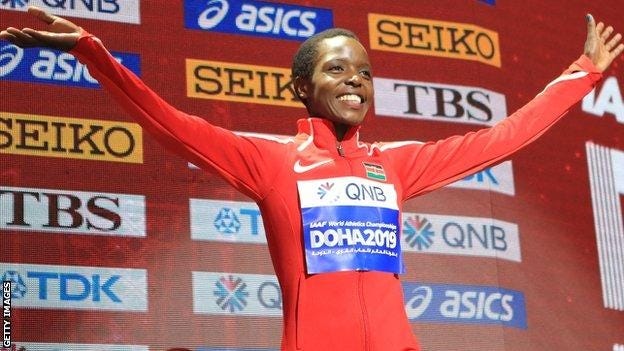Turbulent times for east Africa's female athletes
This newsletter was first published on Patreon on 25 October 2021, a few days after the murder in Iten of Agnes Tirop
It has been a big week for African women’s distance running. On Sunday morning, Letesenbet Gidey of Ethiopia (above) ran a mind-blowing 62 mins 52 secs to break the half marathon world record by over a minute - a time so incredible that the website Letsrun.com thought it may just be “the greatest run in the history of running”. They weren’t simply getting overexcited, either, but had based their assessment on the World Athletics scoring tables, which compare times and distances in all track and field events, and which rank Gidey’s time as the greatest world record in any event.
Gidey is 23, and had never before run a half marathon. Imagine what she’ll do when she gets used to the distance!
But before you start on about doping - as half of Twitter inevitably started doing within a few seconds of the race - Gidey is no flash in the pan. She already holds the world record for the 5,000m and the 10,000m on the track, and as a junior athlete she twice won the world cross-country championships. In the Tokyo Olympics, she finished second behind the great Sifan Hassan, losing out to Hassan’s superior sprint finish.
It’s hard to be certain, largely because of the magic shoes situation, but Gidey may just be emerging as one of those once-in-a-generation talents, like Kenenisa Bekele or Eliud Kipchoge … or Paula Radcliffe.
Of course, despite the immensity of her performance, don’t expect to read anything about it in the sports sections of any newspapers outside east Africa (except perhaps in Spain, since the race took place in Valencia). It’s one of my slightly tiresome bugbears, but if she was a white American, I'm sure she’d get a decent mention after a run like that. Or - at the very least - people would know how to pronounce her name.
The other big story this past week has been the horrific murder of World and Olympic medalist Agnes Tirop, who was stabbed to death in her home in Iten, Kenya. Yes, the same Iten that I lived in when I wrote Running with the Kenyans. Now, Iten is not a dangerous place, so as soon as I heard of Tirop’s murder, my first thought was that it must have been her husband. And indeed, her husband has now been arrested and remains the only suspect.
Agnes Tirop in 2019
The killing brought to the surface a surge of anger from Kenya’s female athletes, with protest marches and campaigns being formed, and many Kenyan women sharing their own tales of domestic abuse and gender-based violence. In fact, just this week another marathon runner was killed by her partner in Kenya.
Like many societies around the world, Kenya is very patriarchal. When a woman starts to become more successful than her husband - as can happen when a woman starts winning races, earning good money and becoming a star athlete - it can lead to issues at home. Of course, as with all domestic violence, much of it goes unreported, but a sign that male violence in the home is so ingrained in Kenyan society, and so accepted as normal, can perhaps be read into the fact that - as far as I know - not a single male Kenyan athlete has spoken out about the nature of Tirop's killing - while virtually every female Kenyan athlete has.
Even after her funeral, Kenyan men expressed their condolences, but they didn’t mention or condemn the culture of male violence behind her death. I was disappointed that even athletes like Eliud Kipchoge and David Rudisha - kind-hearted, likeable men with huge influence in Kenya - didn’t say anything publicly. The only exception was the Ugandan star Joshua Cheptegei, who attended the funeral in Eldoret, and who posted on social media: “Such barbaric and demonizing acts of domestic violence against women, girls and athletes should stop. I strongly condemn [these] inhuman acts.”
Among the Kenyan women speaking out, Mary Ngugi, who recently finished third in the Boston marathon, was particularly vocal, implying on Instagram that it is not just husbands, but coaches too, who need to reign in their controlling ways. She wrote: "The nature of domestic abuse unfortunately is not news in our country, or sport. There are men in our country who take advantage of athletes daily. They recruit from a young age, brainwash, manipulate and control and call this “help”, or “coaching”.
“Should they [the women] become successful on the track, their lives do not reflect that off it. Truth be told, it is so deep that there will be men and women reading this post who could relate to this right now, but either remain silent or do not even realise it - it’s just “normal” here."
I wish the Kenyan women all the best in their campaign to change things, and I hope that some of Kenya’s star men will decide to join them in taking up the cause.
Incidentally, I once met a Spanish filmmaker in Iten who was there making a film about this very issue. If you want to watch it, his film is called The Longest Race and you can find it here: http://www.thelongestrace.com/doc/english.


